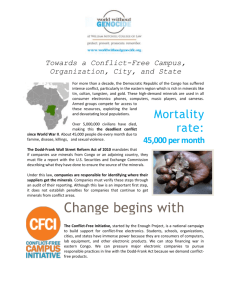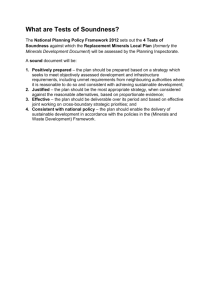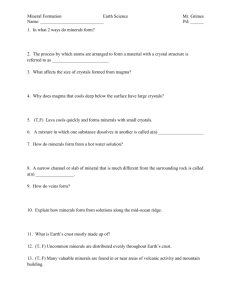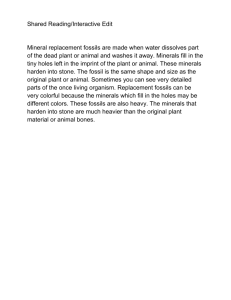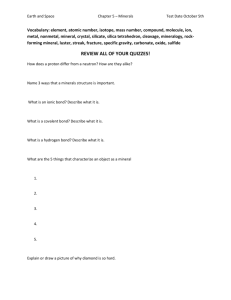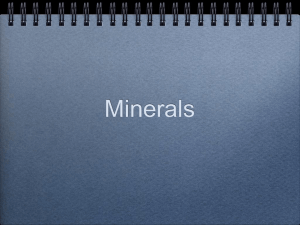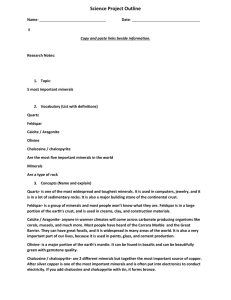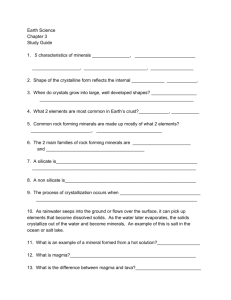Conflict Minerals
advertisement
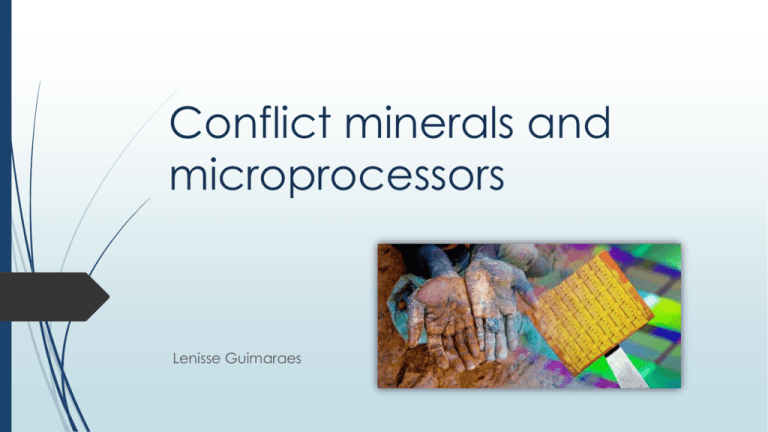
Conflict minerals and microprocessors Lenisse Guimaraes What are conflict minerals? Conflict minerals, as defined by the federal agency of Securities and Exchange Commission (SEC) rules, is a broad term which means columbite-tantalite (coltan), cassiterite, gold, wolframite, or their derivatives which are limited to tantalum, tin or tungsten, regardless of whether these minerals finance conflict in the Democratic Republic of the Congo (DRC) or adjoining countries. Conflict minerals are used in almost all electronics we use every day, from laptops, cell phones, and tablets to cars, airplanes, lighting, and jewelry. What is a microprocessor chip? Central Processing Unit (CPU): the brain of all computers and many household and electronic devices. Three basic characteristics differentiate microprocessors: Instruction set: The set of instructions that the microprocessor can execute. Bandwidth : The number of bits processed in a single instruction. Clock speed : Given in megahertz (MHz), the clock speed determines how many instructions per second the processor can execute. CPU microprocessor chip Minerals in a microprocessor chip Packed inside a microprocessor are many complex layers. These key metals are used to make power efficient electrical connections within the silicon chip itself, from chip to the package which carries it, and from package to the circuit board. Tantalum and Tungsten: part of the wiring connecting transistors and act as a barrier to maintain the integrity of the transistors inside the chip itself. Tantalum can hold the highest electrical charge of any metal, which makes it an ideal component for a device called a capacitor, which stores and releases an electric charge. Tin is used to connect the chip out to the package and the package out to the device board. It has the highest melting point of any pure metal. Its conductivity, meaning its ability to hold an electric charge, makes it attractive to electronics manufacturers. Gold is highly conductive and used in wires and films when a very pure connection between components is required. Conflict minerals and sustainability Triple Bottom Line: people, planet and profit. According to Intel’s research, armed groups illegally tax, extort, and coerce civilians to work. Miners, including children, work up to 48-hour shifts amidst mudslides and tunnel collapses that kill many. Miners get paid $1-$5 daily. They use rape and violence to control the local population. Alternatives: according to the non-profitable organization “Enough Project”, ending the conflict in eastern Congo is the best way to help the Congolese people recover from more than a decade of suffering and violence. A critical aspect of this effort is severing the link between the minerals trade and the armed groups committing atrocities in Congo. There are alternative sources from this minerals in other countries like Australia, China, Brazil and South Africa. However, a ban of Congolese minerals would hurt the miners, so the best option is to develop a conflictfree mineral supply chain. Civil conflict & companies working toward conflict free minerals’purchase SEC rules for conflict free minerals’purchase The company should submit a report including the description of the measures taken to ensure that the minerals bought were conflict free. The measures must include an independent private sector audit. The report must include a description of the manufactured product, the facilities used to manufacture the product and the efforts to determine the mine or location of origin. At the refiners: Since materials from different sources can be mixed together, prior to processing, the upstream origin of the ore is verified to determine which minerals are indeed conflict-free. This step is key to the auditing process due to the relatively stable and manageable number of smelters/refiners and the ability to work cooperatively with these enterprises. Intel’s Current Policy Intel has manufactured the world’s first commercially available, mass produced “conflict-free” processors. Through audit programs driven by Intel and other organizations, smelters are held responsible for documenting the origins of each mineral and accepting minerals exclusively from conflict-free mines. Thank you References http://www.forbes.com/sites/rahimkanani/2014/03/17/why-intel-is-taking-astand-on-conflict-minerals/ http://www.enoughproject.org/conflicts/eastern_congo/conflict-minerals http://www.intel.com/content/www/us/en/corporateresponsibility/conflict-free-minerals.html http://www.webopedia.com/TERM/M/microprocessor.html http://www.theguardian.com/sustainable-business/conflict-free-mineralsruling-litigation-apple-intel
